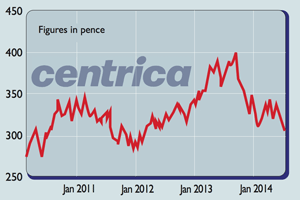
The utility has had a rough ride, but the bad news is in the price, says Phil Oakley.
Utility companies such as Centrica are supposed to be relatively safe investments. We all need to heat and light our homes and that should mean a utility’s profits are quite predictable – which should in turn lead to chunky dividends that grow in line with inflation.
However, in recent years utilities haven’t been as safe as you might expect. That’s because back in the late 1990s, the government decided to remove price controls from the household electricity and gas markets. Competition, we were told, would lead to lower prices.
Sadly, it seems that competition hasn’t worked too well. That’s largely down to the wholesale gas price, which determines the price of electricity most of the time.
As Britain’s own supplies of North Sea gas have steadily dwindled, the electricity industry has become more reliant on gas from elsewhere. The price of this gas has been very volatile, yet household bills have continued to rise nonetheless.
As a result consumers no longer trust the big energy suppliers. Many folk have noticed that bills are very quick to go up when the wholesale gas price rises, but are very slow to come down when it falls.
It makes some people think they are being ripped off. Ofgem, the regulator, has had enough and has referred Centrica and the other energy suppliers to the competition authorities.
Investors don’t like this and Centrica’s share price has been hammered. Yet, buying shares at times of uncertainty can be a smart thing to do as there are lots of sellers and not many buyers. You just have to be patient enough to wait for things to get better. So has Centrica become too cheap?
The outlook
Centrica looks as if it is in a big mess. If an investigation into its British Gas energy supply business wasn’t bad enough, it has said that profits will fall this year as well. It also has a bit of a management crisis.
The chief executive, finance director, and head of British Gas are all leaving soon. These departures may partly have been triggered by the fact that Centrica has become a political football in the run-up to the general election.
So on the face of it, Centrica hasn’t got too much going for it. A competition investigation will probably last two years, while the possibility of a Labour government and an energy-price freeze will frighten some prospective investors.
Then there’s the fact that as Britain’s biggest energy supplier, with 15 million customers, it has a lot to lose. Some customers have already switched to smaller providers, such as Ovo and First Utility, and more are expected to follow.
Centrica’s gas power stations are losing money – due to cheap coal prices – while its American business is struggling to grow and its profits will suffer when they are translated back into pounds. Former money spinners, such as its Rough gas storage facility, have fallen on hard times as well.
However, all this gloom and doom could actually be very good news if you haven’t bought any shares yet. That’s because a lot of the bad news is probably already reflected in Centrica’s share price, which is hovering close to its 52-week low.
A competition inquiry may decide that big energy companies such as Centrica must be split up into separate businesses for generation and supply. This could be good news, as Centrica’s separate businesses might be worth more than their current stock market value as one company.
Centrica has built up its own supplies of gas in recent years. It has invested heavily in places such as the North Sea, Norway and Canada, as well as making its first foray into shale gas in the UK.
These assets have been used to supply its own energy businesses and to provide a hedge against price changes. But they would be sure to attract buyers if they were put up for sale.
The same could be said for its businesses that supply energy to consumers. It may end up with slightly less than 15 million customers in the years ahead, but large customer bases have significant value in the right hands.
Centrica also has a very profitable home services business, which provides boiler, central heating, plumbing and drains insurance.
Should you buy the shares?
A break up of Centrica is unlikely to happen for a while. In the meantime, profits should recover in 2015 as long as last year’s warm winter doesn’t become the norm. The company is also cutting costs and improving customer service.
Uncertainty in the UK energy market has meant that investment is being scaled back. This should result in a big boost to Centrica’s free cash flow, which could end up in shareholders’ hands.
Finally, it’s also worth noting that City analysts are not forecasting a dividend cut either. In fact, Centrica remains committed to growing its dividend payments by more than the rate of inflation. The shares trade on an appetising 5.8% yield, which means that you are being paid to wait for things to get better.
Verdict: a buy for the brave
Centrica (LSE: CNA)
Share price: 305p
Market cap: £15.3bn
Net assets (Dec 2013): £5.3bn
Net debt (Dec 2013): £5.3bn
P/e (prospective): 13.1 times
Yield (prospective): 5.8%
Interest cover: 8.6 times
ROCE: 16.1%
Dividend cover: 1.3 times
What the analysts say
Buy: 10
Hold: 15
Sell: 9
Target price: 315p
Directors’ shareholdings
S Laidlaw (CEO): 2,519,050
N Luff (CFO): 558,475
R Haythornthwaite (Chair): 12,500